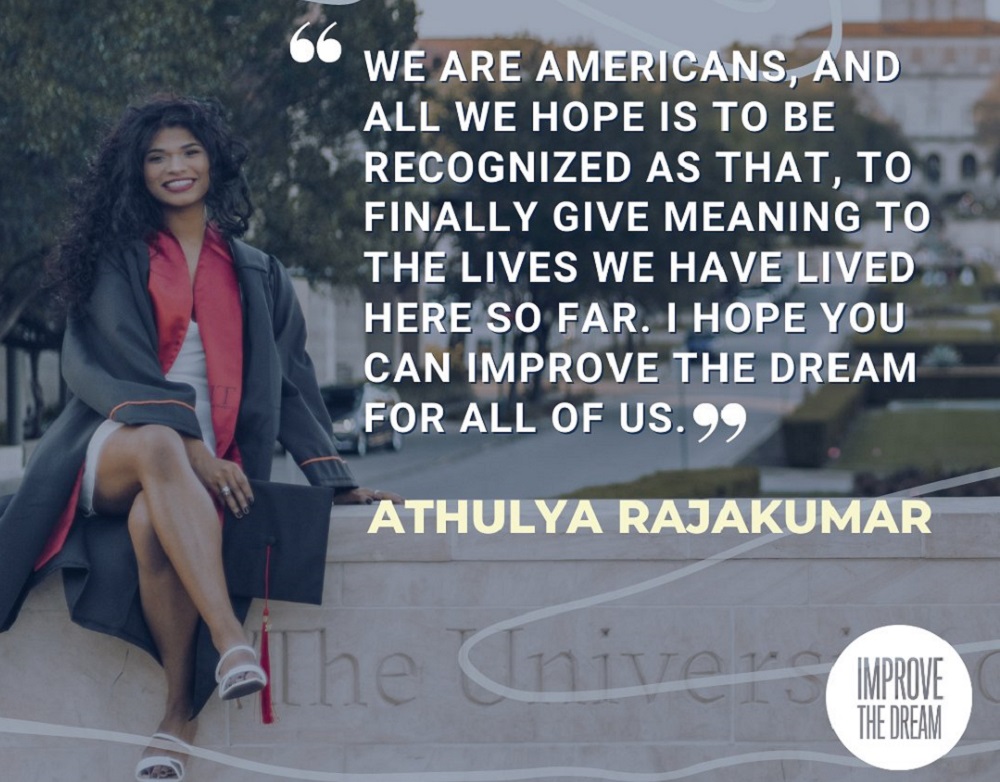
Texas University graduate hopes Congress can improve the American dream for all legal Dreamers
Athulya Rajakumar was four and her brother six when their mother came to the US leaving an abusive marriage behind in India in search of a better life for the family.
America is the only home the 23-year-old recent journalism graduate of the University of Texas at Austin has known for nearly two decades.
Yet today she faces the prospect of self- deportation after aging-out of the immigration system like over 200,000 other young immigrants, who have grown up in the US as child dependents of long-term visa holders.
A member of Improve The Dream, a youth-led organization that supports and advocates for the Dreamers, Rajakumar shared the story of her struggle with a Senate panel on March 15.
Read: As Biden completes one year, Indian legal dreamers demand relief (January 18, 2022)
She was testifying before the Senate Judiciary Committee Subcommittee on Immigration, Citizenship and Border Safety at a hearing on “Removing Barriers to Legal Migration to Strengthen our Communities and Economy.”
After completing her master’s at the Queensland University in Australia, Rajakumar’s mother “was chosen to come to America on a cultural exchange student visa with us as her J-2 dependents.”
“After graduating, she secured a full-time job at Microsoft, which then sponsored her H-1B work visa, with her children as H-4 dependents,” Rajakumar told the panel.
“Eventually, in 2012, she was finally able to apply for her green card with me and my brother as her dependents. After nearly a decade in the green card backlog, I aged out of that application in January of 2020, when I turned 21,” she said.
“My single mother worked hard to support me and my brother on her own,” Rajakumar said.
“As a child, I did not always understand the meaning behind the letters and numbers surrounding our immigration status, but it was clear to me that they were imperative to legally remaining in this country.”
“I learned very young that every aspect of my entire life would be controlled and overshadowed by my visa status. I became used to opportunities being taken away by a factor out of my control,” Rajakumar said.
“As my brother and I grew up, we were essentially forced to raise ourselves because my mother was working overtime to make sure she kept a roof above our heads and food on the table, but most importantly retained our visa status,” she said.
Read :How a DACA update can help documented dreamers (January 31, 2022)
“But this constant uncertainty and anxiety eventually caught up to us in our adolescence. We both faced severe mental health issues, my older brother to a much worse extent,” she said.
“His mental health began to rapidly decline once he hit high school. For ten years, we – as a family – struggled to navigate his severe depression and mood swings,” Rajakumar said.
“And though all my mother wanted to do was quit her job and stay home to care for my brother, risking her job meant risking our entire lives here—everything we had worked so hard for,” she said.
“Thus, we soldiered on,” Rajakumar said. Her brother attended the most academically rigorous high school in the state with the goal of becoming an immigration lawyer.
“However, the day before his orientation at the University of Washington, my brother took his own life,” Rajakumar said. “Our entire family was torn apart, our worlds turned upside down.”
“The most cruel part of this whole tragic situation was that we were not even given the proper time to mourn, process or heal,” she recalled. “Once again, our visa status controlled our lives – even when one of us was dead.”
Recently, Rajakumar said she received a prestigious full-time employment offer from a major news corporation in Houston, but they withdrew it the second they heard about her visa status.
Without congressional action that creates a clear, reliable pathway for her to apply for permanent residency, she might would be forced to leave not only the country she has called home for nearly 20 years.
Over 5,000 other Documented Dreamers face this possibility every year, despite having maintained a documented status, Rajakumar noted.
“Members of Improve The Dream hope that one day, everyone who grows up in America will have a clear opportunity to become an American citizen, pursue their passions, and fully contribute to our country,” she said.
“We are hardworking, skilled young Americans, and we hope to be recognized as that — as Americans — and to finally give meaning to the lives we have lived here so far,” Rajakumar said. “I hope you can improve the dream for all of us.”
Senator Alex Padilla, Democratic chair of the panel said he was “outraged by this broken system that you, your brother, and thousands of documented dreamers have had to face.”
“The gap between our country’s needs and the realities of our broken immigration system should come as no surprise,” he said noting currently, there’s a backlog of 1.4 million people who are eligible for employment-based visas.
John Cornyn, the top Republican on the panel, cited Congressional Research Service’s estimate that without significant changes, the employment-based green card backlog could exceed two million by 2030.
“Indian nationals have been hit especially hard because our system’s per-country caps do not allow them to receive more than seven per cent of the available employment-based visas in any given year,” he noted.
Read: Senators Hear The Story Of Athulya Rajakumar, A Dreamer (March 17, 2022)
Dip Patel, president of Improve The Dream, stated that Rajakumar’s moving testimony shows the urgent need to update the broken system.
“Delay in taking action will not only lead to tearing more families apart but also continue the immense emotional turmoil faced by thousands of families who contribute to our country and call America home.”
“We urge Congress to consider this and act fast to pass common-sense immigration reform,” he said.



